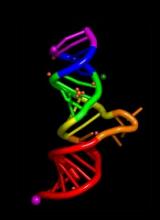The US Food and Drug Administration (FDA) has lifted the hold on clinical trials of fitusiran, an RNAi therapeutic being developed to treat patients with hemophilia A and B, with and without inhibitors.
The hold encompassed a phase 2 open-label extension study and the ATLAS phase 3 program, which includes 3 separate trials.
Dosing was suspended in these trials after a fatal thrombotic event was reported in a patient enrolled on the phase 2 trial.
The patient had hemophilia A without inhibitors. He developed exercise-induced right hip pain that was treated with 3 doses of factor VIII concentrate (31-46 IU/kg) on 3 separate days.
The patient then developed a cerebral venous sinus thrombosis that was considered possibly related to treatment. He ultimately died of cerebral edema.
As a result of this death, Alnylam Pharmaceuticals, Inc., (the company developing fitusiran with Sanofi Genzyme) announced the hold on fitusiran trials in September.
Since then, Alnylam has reached an agreement with the FDA on new clinical risk mitigation measures for fitusiran trials. This includes protocol-specified guidelines and additional investigator and patient education concerning reduced doses of replacement factor or bypassing agent to treat any breakthrough bleeds in fitusiran studies.
With these protocol amendments in place and clinical materials updated, the FDA has lifted the hold on fitusiran trials.
“We are pleased with the FDA’s decision to lift the clinical hold, as fitusiran holds the potential to help improve the lives of people living with hemophilia,” said Akin Akinc, PhD, vice-president and general manager of fitusiran at Alnylam.
“With the additional risk mitigation measures in place, we look forward to the continued late-stage development of fitusiran and expect to resume dosing around year-end.”
About fitusiran
Fitusiran is an investigational, once-monthly, subcutaneously administered RNAi therapeutic targeting antithrombin. It is in development for the treatment of hemophilia A and B, with and without inhibitors.
Fitusiran is designed to lower levels of antithrombin with the goal of promoting sufficient thrombin generation to restore hemostasis and prevent bleeding.
Fitusiran is under investigation in a phase 2 open-label extension study of patients with moderate or severe hemophilia A or B who have participated in a previous clinical study of fitusiran.
The therapy is also being tested in the phase 3 ATLAS program, which includes 3 trials.
The ATLAS-INH trial is a 9-month, randomized, active controlled study designed to enroll approximately 50 patients with hemophilia A or B with inhibitors who received prior on-demand therapy.
The ATLAS-A/B trial is a 9-month, randomized, active controlled study designed to enroll approximately 100 patients with hemophilia A or B without inhibitors who received prior on-demand therapy.
The ATLAS-PPX trial is a one-way crossover study designed to enroll approximately 100 patients with hemophilia A or B, with or without inhibitors, receiving prophylaxis therapy as prior standard of care.
In ATLAS-PPX, patients receive standard of care prophylaxis for 6 months and then transition to fitusiran treatment for 7 months. The study’s primary endpoint is the annualized bleeding rate in the fitusiran period and in the factor/bypassing agent prophylaxis period.


